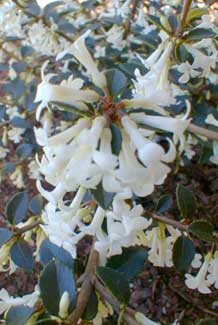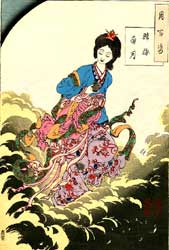
Delavay's Osmanthus; or,
Delavay Tea Olive
"A flower in moonlight, she was there,
Was rippling down white ways of glamour
Quietly laid on wave & air."
-Rupert Brooke
(1887-1915)
(1887-1915)
Osmanthus delavayi is a large evergreen or semi-evergreen shrub. It was introduced to France in 1890 by Abbe Jean Marie Delavay (1834-1895); you can read a little about Abbe Delavay & see his portrait on the Asarum delavayi page. It was introduced to England some years later by another plant-hunter in China, George Forrest (1873-1932); you can read a bit about Forrest & see his portrait on the Rhododendron yungningense page.
Osmanthus has small tough ovate leaves, dark green atop, speckled below, on long twiggy sometimes fountaining branches. In March & ealry April, these branches are full of extremely fragrant white tubular flowers, dangling in axillary & terminal clusters so that the entire shrub shines white.
Other species of Osmanthus bloom near or during autumn, but this one's for late-winter or early spring. The genus name means "Fragrant Flowers" with good reason. Blossom scent is halfway between daphne & jasmine, one of the best scents indeed, so placement near foot traffic will be greatly appreciated.
Flowers are followed by oval blue drupes which are ripe by September, not often numerous. These are evidently not regarded as edible, though osmanthus is of the olive family & some species are edible. The flowers are regarded as edible, floated as a fragrant garnish in drinks, or dried & added as a seasoning in fancy tea mixes, or in potpouri.
Though slow-growing, this will eventually become a big shrub, either rounded or slightly fountaining, a bit wider than it is tall. Most garden specimens will reach only the six to ten foot range, though twenty foot specimens exist in the wild. It tends to be a tidy shrub even if never pruned, & can form an extravagant big groundcover.
It is easily kept at a smaller size because it takes to sheering quite well, so much so that it can be used as a hedge. It is so shapable it has even been used as a topiary shrub. Best time for pruning is soon after it finishes flowering; if pruned later it won't suffer but many of the buds for the following year's flowering will be removed.
It wants full sun to bright shade in zones 7 through 9, but some protection from very cold winter winds is advisable. It prefers moderate moisture in well draining soil for maximum bloom & growth, but becomes very drought tolerant after it has been established a couple of years. It can adapt to a wide range of soil conditions from alkaline limestone soils to acidic. It likes best a bit of alkalinity & feedings of lime might be beneficial.
Sacred to the gods & goddesses of Taoism & of Northern Buddhism, numerous species of osmanthus are grown on the grounds of Chinese & Japanese temples. To kneel before the late winter flowers to smell them is the same as bowing before the Divine. Several species of Osmanthus receive special honors of week-long festivals in autumn, the time when the majority of species flower, but if you are absent from the autumn celebration, Delavay's Osmanthus permits spring honors for the Moon Lady's Tree.
 The Moon Lady is shown at right in a portrait by Yoshitoshi (1839-1892). Her name was Chang Er, or Chang Oh, the fairy-wife of the heavenly archer Hou Yi, whose bow was the sliver moon. In the beginning of the world there were ten suns that circled the earth & each lit the world in turn, & these sons were the pious children of the Celestial Jade Emperor. But one day Hou Yi heard prayers from the Earth, where there was famine & drought because the ten suns had arrived in the sky all at the same time.
The Moon Lady is shown at right in a portrait by Yoshitoshi (1839-1892). Her name was Chang Er, or Chang Oh, the fairy-wife of the heavenly archer Hou Yi, whose bow was the sliver moon. In the beginning of the world there were ten suns that circled the earth & each lit the world in turn, & these sons were the pious children of the Celestial Jade Emperor. But one day Hou Yi heard prayers from the Earth, where there was famine & drought because the ten suns had arrived in the sky all at the same time."Do not rise together at one time!" Hou Yi chastised the ten suns, but they said, "We are the Lights of the Jade Emperor. We will do as we please." So with his arrows, Hou Yi extinguished nine of the ten suns to save the world.
By this act, Heaven's Jade Emperor had his sun-bath spoiled, his lights extinguished, his children slain. Wrathfully he said to Hou Yi, "You like the Earth so much you would destroy the brightness of heaven? In that case, you are banished from the sky, & can live among mortals without your immortality."
Hou Yi indeed loved the Yellow Earth & became a good ruler thereupon, where he was incarnated as the Tang Emperor Xuanzong. His wife so missed the court of heaven that she stopped speaking, & no loving act of the emperor would induce her to speak. But while her husband slept, she would burn incense & pray to the Full Moon for deliverance, saying, "My husband, not I, was banished from Heaven. Why must I suffer with him? Why must I grow old beside him as a mortal? I long for eternal youth & court life in the Celestial Pavillion with its splendid gardens & riches!"
When her husband caught Chang Er in her prayers of infidelity, a rift grew between them, & in his anger Hou Yi became a less & less kindly ruler, so that rebels rose up among the people.
On a warm autumn night, on an evening of the Full Moon, the emperor & his wife were seated in a garden viewing station observing the beauty of the swollen moon, eating dainty sugared flowers taken from the osmanthus shrubs. A Taoist priest, Luo Gongyuan, came before the emperor & empress & fell upon his face below the moon-viewing station. He pulled from his priestly robes a folded paper & a goblet of osmanthus wine. He unfolded the paper & poured from it a sparkling powder into the wine.
Handing the goblet up to the emperor, the priest said, "This medicine will restore your immortality." Hou Yi thought to himself, "Forces are against me. This priest may be trying to poison me. Before I drink of this cup, I will test it on Chang Er." Aloud he said, "Fair wife, you have lamented your mortality, you may take the first sip."
But when she took the goblet, Chang Er was thinking, "My husband has become a tyrant. How the earth will suffer if he is made immortal!" So she gulped down the entire brew. Hou Yi was so furious he drew his bronze sword & tried to behead his wife. But as soon as she had taken the herbal brew, she discovered could fly.
She planned to escape to heaven, & flew upward laughing. She got only as far as the Moon when she discovered her ability to fly was weakening. She landed at the gate of the Moon's Vast & Frozen Palace.
At the main gate of the jade & jasper palace there grew an enormous, redolent osmanthus tree, beneath which squatted a jade rabbit with mortal & pestle, manufacturing the herb of immortalilty.
The Vast & Frozen Palace with its gardens had all the things that she had missed about heaven, but soon she realized nothing dwelt in the forest except that rabbit. With only her pet beside her, she wandered the wilderness of osmanthus, lamenting her infidelities that had resulted in this loneliness.
But others say that Chang-Er is like a bhodisattva who was rising to heaven upon her moment of enlightenment when a great pity for the world rose in her, & she chose to rise no further than the Moon, so that she would be close enough to the Earth to hear their prayers. At the time of autumn's Harvest Moon, she returns to the earth, & grants the prayers of those all deserving who beseech her.
Centuries after Cheng-Er arrived upon the moon, there lived an earthly woodcutter, Wu Kang. One night he slipped by stealth into the garden of the Temple of Xi Wangmu the Queenmother of the West, in order to cut up one of Her ancient osmanthus trees & heap up its many branches to sell as firewood.
Wu Kang heaped the branches upon his back & slipped away by moonlight, but was suddenly overcome with drowsiness. He lay down a moment to rest, & when he opened his eyes, he was in a fabulous garden. He came to the place of the jade rabbit under the gigantic osmanthus which grows upon the moon, the shadow of which is visible from the earth.
"Rabbit," said Wu Kang. "Where is this place?"
"It is Chang-Er's Garden of the Moon," said the rabbit, setting aside his pestle.
"Why are you in this place?" asked Wu Kang.
"Long ago," said the rabbit, "three sages disguised themselves as beggars & set out to test the generosity of the Fox, the Monkey, & myself. They asked the Fox for some of his food, & the Fox gave grapes to each of them. They asked the Monkey for some of his food, & he gave each a piece of melon. But when they came to me purporting to be starving, I had only grass to eat, which cannot sustain beggars. Feeling pity for them, I told them to skin & dress me & have me for their meal. As reward, my spirit was made immortal, & I live in this splendid garden where I am happy to practice herblore. It's a good life for me, but for human beings, the Moon is vast & cold."
"Why have I awakened in your garden?" asked Wu Kang.
The rabbit told him, "You cut down a sacred osmanthus in the Temple of the Moon Lady. That osmanthus was the grandson of the tree that overshadows the Red Pavillion & the Garden of the Moon. The Jade Emperor has banished you to this place as punishment. But you can return home as soon as you have cut down the Moon's osmanthus."
The woodcutter, missing his family, was eager to return home. So he began hacking at the redolent tree. Everytime he cut into a limb, it healed instantly. He is there to this day, cutting & cutting, to no avail.
Now the story is not told whether Chang Er & Wu Kang ever became friends. But because Chang Er's sin was infidelity, we may presume she has some relief of her loneliness thanks to the presence of the woodcutter.
The varioiusly called Aroma Festival, Reunion Festival, or Mooncake Festival celebrates the Moon Lady, the Rabbit, & the Woodcutter. It is held during September's full moon, when the majority of nearly two-dozen types of osmathus species are aflower. But Delevay's Osmanthus waits until winter's end to bloom, & the scent of it is Chang Er's & Wu Kang's nostalgia.